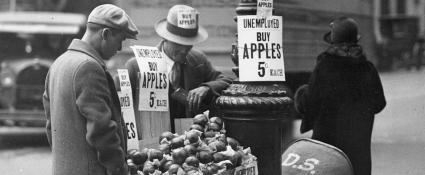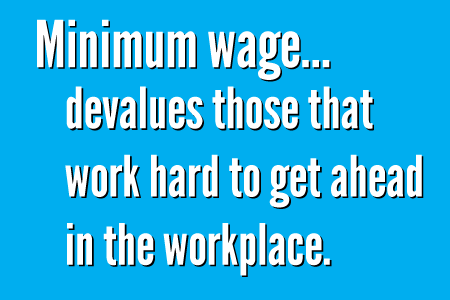
Minimum wage laws have been around for a very long time to help the disadvantaged make a better living for themselves. Or, so we are told. The first Federal Minimum Wage under the Fair Labor Standards Act was a whopping $.25 and enacted on October 24, 1938. (source)
Before I started working at age 15, I thought that the idea of a minimum wage was a great thing. It meant, to my way of thinking at the time, that my minimum worth was set for me and I didn't have to worry about it.
When I got my first job (besides a paper route) in the fall of 1989, the minimum wage was $3.35. I was hired at El Pollo Loco near my home in Mesa, Arizona. It was a good job for a young kid just starting out (but don't get me started on the child labor laws that prevented me from working as much as I wanted).
I learned quickly that I didn't want my minimum worth to be set by some politician but instead by my own hard work. I found that if I applied myself, I could get raises. In fact, I got raises pretty quickly because of my hard work. By April 1990, I was earning $3.55 per hour.
Now, that may not seem like much. However, to get a $.20 raise in my first six months, I felt was a great thing.
April 1990, the minimum wage increased from $3.35 to $3.80. I went from making $3.55 to $3.80 over night. Great, huh?
Nope. It made me angry. I worked hard to get that $.20 raise. There were others that started before I did that didn't work as hard and therefore didn't get the raise that I did. On April 1, 1990, all my hard work was for naught.
Don't get me wrong. It was nice to get another $.25 raise. But, by my way of thinking, I should have been able to maintain my $.20 raise above those that didn't work as hard as I did.
Fast forward to summer of that same year. I started working for Target. I was hired as a cart boy. They had a great program that you could get a raise for being cross-trained into different departments. Because I also trained as a cashier from the beginning, my opening wage was $4.00 per hour. (At least I got my $.20 back.)
After that, I found that every time I trained for another department, I could get another $.25 raise. I had to wait about six months before I could do that the first time. I don't remember my first department I added but by April 1991, I was earning $4.25 per hour.
I worked hard for that raise and started working on getting trained for my next department.
April 1, 1991, the minimum wage increased to $4.25. People starting, without putting in the hard work that I did, started at my wage. They started at the point that I had worked hard to attain.
Again, I was very frustrated. When the minimum wage went up, I was essentially cheated out of $.45 per hour. Those who didn't work as hard or started later were earning the same amount.
Over the next year, I ended up being cross-trained in multiple departments and was making $5.50 per hour. It was a great wage at the time for a high-school student.
Now, as a business owner, I hate minimum wage, too. The only time I pay minimum wage is when I have an intern that is learning the ropes. Even then, I don't keep them at minimum wage more than 90 days. If they aren't qualified for more after 90 days then they aren't qualified to work for me.

What's more is that I pay them minimum wage when I can actually find interns that are willing and legally able to work as an intern free of charge to me. I don’t pay them minimum wage because I'm legally responsible to but because I want to give them something for their time. When they demonstrate they can perform, I move them to a permanent position and pay them above minimum wage.
I think that the bottom line is that I hate minimum wage because it devalues those that work hard to get ahead in the workplace. If the minimum wage goes up, no one in my company will get paid more. The only financial impact on my employees will likely be the potential of increasing their cost of living.
I think, even in a struggling economy, there is plenty of work for the person that is willing to do what it takes to stand out in the crowd. In 1932, at the beginning of the great depression, the unemployment rate was 23.6%. That means that 76.4% of the population was working. (source). The unemployment rate today is 7.6%, which means that 92.4% of the people who want to work are working. (source)
If we continue to raise the minimum wage, we are simply going to make it harder for those that strive to be successful to get ahead.

